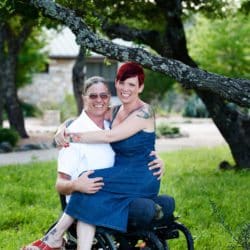Being a caregiver is one of the best jobs in the world because I get to take care of another injured service member.
At what moment did you realize you were a military caregiver?
I realized I had become a caregiver when my partner blew through $400,000 and I had to take over her finances. I hadn’t realized the severity of her post traumatic stress disorder (PTSD). Finances really affect disabled vets and make them overly frustrated and anxious.
What was one of the first major challenges you faced as a military caregiver?
I had a difficult time establishing intimacy with Kym. I had to learn not to be her hurt by her inability to express her feelings. We worked with counselors and I have found it very freeing to talk with other caregivers and veterans.
How has being a military caregiver changed you?
I tell Kym all the time, “You’ve made me a better man.” I am so much more patient and empathetic than I ever was. It took time, but I realized that she was not forgetting things on purpose. Seeing her go through the process of accepting her disability helped me recognize that I had undergone the same process when I had a spinal-cord injury many years earlier.

My Story
Don's partner, Kym, was a U.S. Army Casualty Assistance Noncommissioned Officer in charge in Iraq and administered the burial of 187 soldiers during her tour. After her husband was killed by a roadside bomb during his second deployment to Iraq in 2007, her invisible wounds became apparent. She had to quit her job as an executive for Estee Lauder due to PTSD, memory loss, anxiety, major depression, suicidal ideation, and other issues. Oftentimes, people assume she is Don's caregiver, as he is in the wheelchair and many caregivers are female.
As a Dole Fellow, Don raises awareness of how simple tasks can be overwhelming to combat veterans and he helps caregivers understand not to take hurtful words or behaviors personally.










